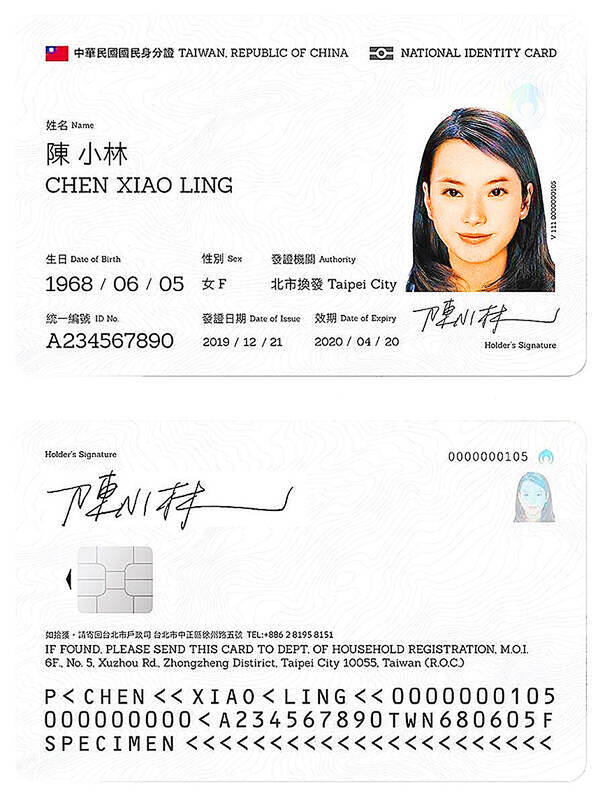Members of the legislature’s Internal Administration Committee yesterday approved a motion to set up a task force to look into the Cabinet’s undertaking of the planned electronic identification card (eID) system and to inquire about possible misconduct by government officials.
Introduced by the Ministry of the Interior in 2018, the eID project aimed to replace existing national ID cards and Citizen Digital Certificates. It was suspended in 2021 after civil society groups and human rights activists raised concerns about possible privacy violations and security risks.
Chinese Nationalist Party (KMT) Legislator Hsu Yu-chen (許宇甄) said that the ministry had spent more than NT$1.41 billion (US$44.54 million) on the project, including a current budget item for NT$280 million, which is the agreed upon figure for compensating contractors for not proceeding with the system.

Photo: screen grab from Ministry of the Interior Web site
Minister of the Interior Lin Yu-chang (林右昌) defended the payouts.
“This amount for compensation is the best result for taxpayers... We had negotiated with the contractors over the past two years. In mediation, they at first demanded NT$1 billion for compensation, under the terms of the signed agreement, but we negotiated it down to NT$280 million,” Lin said.
Hsu and other KMT lawmakers questioned the finances, saying that the ministry still included NT$63.75 million in this year’s fiscal budget for the project.
Lin said the funds were allocated for repairs and the servicing of equipment that had been originally intended for eID production at the main contractor, state-owned Central Engraving and Printing Plant, which is the state mint under the central bank for printing banknotes.

The first global hotel Keys Selection by the Michelin Guide includes four hotels in Taiwan, Michelin announced yesterday. All four received the “Michelin One Key,” indicating guests are to experience a “very special stay” at any of the locations as the establishments are “a true gem with personality. Service always goes the extra mile, and the hotel provides much more than others in its price range.” Of the four hotels, three are located in Taipei and one in Taichung. In Taipei, the One Key accolades were awarded to the Capella Taipei, Kimpton Da An Taipei and Mandarin Oriental Taipei. Capella Taipei was described by

EVA Airways today confirmed the death of a flight attendant on Saturday upon their return to Taiwan and said an internal investigation has been launched, as criticism mounted over a social media post accusing the airline of failing to offer sufficient employee protections. According to the post, the flight attendant complained of feeling sick on board a flight, but was unable to take sick leave or access medical care. The crew member allegedly did not receive assistance from the chief purser, who failed to heed their requests for medical attention or call an ambulance once the flight landed, the post said. As sick

Minister of Economic Affairs Kung Ming-hsin (龔明鑫) yesterday said that private-sector refiners are willing to stop buying Russian naphtha should the EU ask them to, after a group of non-governmental organizations, including the Centre for Research on Energy and Clean Air (CREA), criticized the nation’s continued business with the country. While Taiwan joined the US and its Western allies in putting broad sanctions on Russia after it invaded Ukraine in 2022, it did not explicitly ban imports of naphtha, a major hard-currency earner for Russia. While state-owned firms stopped importing Russian oil in 2023, there is no restriction on private companies to

INDUSTRY: Beijing’s latest export measures go beyond targeting the US and would likely affect any country that uses Chinese rare earths or related tech, an academic said Taiwanese industries could face significant disruption from China’s newly tightened export controls on rare earth elements, as much of Taiwan’s supply indirectly depends on Chinese materials processed in Japan, a local expert said yesterday. Kristy Hsu (徐遵慈), director of the Taiwan ASEAN Studies Center at the Chung-Hua Institution for Economic Research, said that China’s latest export measures go far beyond targeting the US and would likely affect any country that uses Chinese rare earths or related technologies. With Japan and Southeast Asian countries among those expected to be hit, Taiwan could feel the impact through its reliance on Japanese-made semi-finished products and